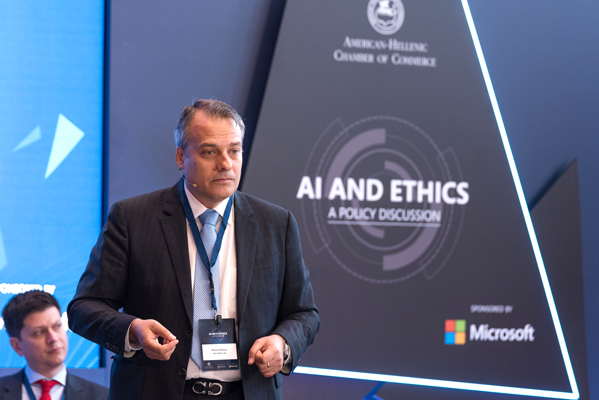Απομυθοποιώντας την Τεχνητή Νοημοσύνη
Ο Μιχάλης Μπλέτσας θα μιλήσει για τους μύθους και τις αλήθειες που συνοδεύουν την ΑΙ, για τις προσδοκίες και τους φόβους που προβάλλουμε πάνω της, και για τον πραγματικό ρόλο που παίζει και θα παίζει εφεξής στη ζωή μας. Θεωρεί ότι πρέπει να δούμε την τεχνητή νοημοσύνη επικουρικά, ως αρωγό. Αυτή είναι η λέξη κλειδί για την AI.Η Τεχνητή Νοημοσύνη μπορεί να επιταχύνει την επιστήμη, όχι όμως να την υποκαταστήσει και να πάρει αποφάσεις για λογαριασμό της.



 Γεννήθηκε στα Χανιά. Σπούδασε ηλεκτρολόγος μηχανικός στο Αριστοτέλειο Πανεπιστήμιο Θεσσαλονίκης. Στη συνέχεια έφυγε για μεταπτυχιακά στη Βιοϊατρική στις ΗΠΑ. Σε ηλικία 29 ετών έγινε διευθυντής Πληροφορικής του Media Lab, ερευνητικού εργαστηρίου που ανήκει στο Τεχνολογικό Ινστιτούτο της Μασαχουσέτης (MIT).
Υπήρξε ένα από τα ιδρυτικά στελέχη της One Laptop Per Child, μιας μη κερδοσκοπικής εταιρείας που σχεδίασε και κατασκεύασε ένα laptop πολύ χαμηλού κόστους – μιας τεχνολογίας που στόχευε να βοηθήσει στο το πώς μορφώνονται τα παιδιά στον κόσμο. Κατά την διάρκεια της θητείας του στην OLPC, συνέβαλε στον βιομηχανικό σχεδιασμό, τα ηλεκτρονικά καθώς και το λογισμικό του laptop XO-1 της OLPC.
Πριν προσχωρήσει στο Media Lab, ήταν μηχανικός συστημάτων στην Aware, Inc., όπου σχεδίασε και έγραψε βιβλιοθήκες λογισμικού υψηλής απόδοσης για τους παράλληλους υπερυπολογιστές κατανεμημένης μνήμης της Intel, και ασχολήθηκε με την εφαρμογή της τεχνολογίας ADSL για παροχή διαδικτυακής πρόσβασης σε οικιακούς χρήστες.
Έχει εκτεταμένη συμβουλευτική δραστηριότητα γύρω από θέματα τεχνολογίας και τεχνολογικής πολιτικής.
Υπήρξε συνιδρυτής δύο εταιρειών και μέλος ΔΣ ή σύμβουλος σε πολλές άλλες.
Πρόσφατα αποδέχτηκε τη θέση του Διοικητή Εθνικής Αρχής Κυβερνοασφάλειας στο Υπουργείο Ψηφιακής Διακυβέρνησης.
Γεννήθηκε στα Χανιά. Σπούδασε ηλεκτρολόγος μηχανικός στο Αριστοτέλειο Πανεπιστήμιο Θεσσαλονίκης. Στη συνέχεια έφυγε για μεταπτυχιακά στη Βιοϊατρική στις ΗΠΑ. Σε ηλικία 29 ετών έγινε διευθυντής Πληροφορικής του Media Lab, ερευνητικού εργαστηρίου που ανήκει στο Τεχνολογικό Ινστιτούτο της Μασαχουσέτης (MIT).
Υπήρξε ένα από τα ιδρυτικά στελέχη της One Laptop Per Child, μιας μη κερδοσκοπικής εταιρείας που σχεδίασε και κατασκεύασε ένα laptop πολύ χαμηλού κόστους – μιας τεχνολογίας που στόχευε να βοηθήσει στο το πώς μορφώνονται τα παιδιά στον κόσμο. Κατά την διάρκεια της θητείας του στην OLPC, συνέβαλε στον βιομηχανικό σχεδιασμό, τα ηλεκτρονικά καθώς και το λογισμικό του laptop XO-1 της OLPC.
Πριν προσχωρήσει στο Media Lab, ήταν μηχανικός συστημάτων στην Aware, Inc., όπου σχεδίασε και έγραψε βιβλιοθήκες λογισμικού υψηλής απόδοσης για τους παράλληλους υπερυπολογιστές κατανεμημένης μνήμης της Intel, και ασχολήθηκε με την εφαρμογή της τεχνολογίας ADSL για παροχή διαδικτυακής πρόσβασης σε οικιακούς χρήστες.
Έχει εκτεταμένη συμβουλευτική δραστηριότητα γύρω από θέματα τεχνολογίας και τεχνολογικής πολιτικής.
Υπήρξε συνιδρυτής δύο εταιρειών και μέλος ΔΣ ή σύμβουλος σε πολλές άλλες.
Πρόσφατα αποδέχτηκε τη θέση του Διοικητή Εθνικής Αρχής Κυβερνοασφάλειας στο Υπουργείο Ψηφιακής Διακυβέρνησης. MIT Media Lab
Tο MIT Media Lab είναι ένα ερευνητικό εργαστήριο στο Ινστιτούτο Τεχνολογίας της Μασαχουσέτης.
Όταν το MIT Media Lab άνοιξε για πρώτη φορά τις πόρτες του το 1985, συνδύασε ένα όραμα για ένα ψηφιακό μέλλον με ένα νέο στυλ δημιουργικής εφεύρεσης. Συγκέντρωσε ερευνητές από μακρινούς τομείς που ήταν παθιασμένοι με τη δημιουργική έκφραση και το σχεδιασμό, με πρωτοπόρους στον αναδυόμενο τομέα της ψηφιακής τεχνολογίας. Κατά την πρώτη δεκαετία του (1985-1995), το εργαστήριο ανέπτυξε και επέδειξε ένα ευρύ φάσμα ιδεών για το πώς οι αναδυόμενες τεχνολογίες μπορούν να μεταμορφώσουν τη μάθηση, την ψυχαγωγία και την αυτοέκφραση. Πολλές πτυχές της ψηφιακής επανάστασης μπορούν να αναχθούν σε ιδέες του Media Lab.
Η δεύτερη δεκαετία (1995-2005) είδε την προσθήκη και την ενσωμάτωση της διάχυτης, πανταχού παρούσας πληροφορικής. Οι ερευνητές του εργαστηρίου πρωτοστάτησαν σε τομείς όπως οι φορετοί υπολογιστές, τα δίκτυα αισθητήρων, τα απτά μέσα και οι συναισθηματικοί υπολογιστές – ενισχύοντας περαιτέρω την ικανότητά μας να εκφραζόμαστε και να αλληλεπιδρούμε με πιο ανθρώπινο τρόπο με την τεχνολογία μας.
Η τρίτη δεκαετία (2005-2015) επικεντρώθηκε στις βιολογικές επιστήμες και τεχνολογίες. Οι ερευνητές του εργαστηρίου βρίσκονται στην πρώτη γραμμή της εισαγωγής της διεπαφής ανθρώπου-μηχανής πάνω και μέσα στο σώμα, στην καινοτομία νέων υλικών και μεθόδων κατασκευής και στη διερεύνηση νέων εργαλείων και τεχνολογιών για την υγεία και την ευημερία.
Καθώς η τεχνολογία έχει προχωρήσει και έχει κάνει την παρουσία της πιο αισθητή, το ήθος και η εστίαση του Εργαστηρίου έχουν μετατοπιστεί για να ασχοληθούν περισσότερο με την ηθική, τη συμμετοχικότητα, τη βιωσιμότητα και τη δικαιοσύνη του αντίκτυπου της τεχνολογίας στην ανθρωπότητα και στον κόσμο. Τώρα στην τέταρτη δεκαετία του, το Media Lab επικεντρώνεται στην επίλυση των πρωτοφανών τεχνολογικών, κοινωνικών και παγκόσμιων προκλήσεων σε επίπεδο συστημάτων – σχεδιασμού για ανθρώπινα δίκτυα, για τις πόλεις, για τις τέχνες και για τον εγκέφαλο και το σώμα.





